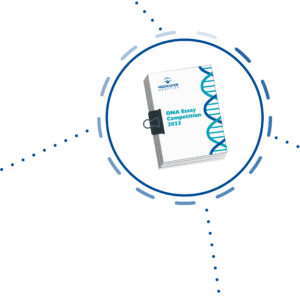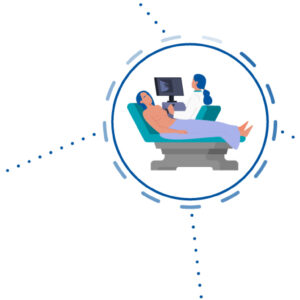Long QT syndrome (LQTS) is a clinically and genetically heterogeneous heart disease characterized by prolonged ventricular repolarization. An extended frequency-corrected QT interval (QTc) of 460 to >500 ms can be demonstrated in long-term ECG. At the molecular level, the extended QTc interval is the consequence of a decrease in the outward K+ currents (mainly IKs, IKr and IK1) or an increase in the inward currents (mainly INa and ICaL). Depending on the QTc, arrythmias occur, which can lead to unconsciousness and sudden cardiac death. The 10 year mortality rate is 50% if untreated. A distinction is made between the frequent autosomal dominant Romano-Ward (RW) form and the very rare autosomal recessive Jervell-Lange-Nielsen (JLN) form. The prevalence of long QT syndrome in the Caucasian population is at least 1:2,500.
A postpubertal QTc >470 ms for men, >480 ms for women and >460 ms for children should serve as the cutoff for genetic diagnosis, as this collective can benefit from the diagnostics. Pathogenic variants in one of the three genes KCNQ1, KCNH2 and SCN5A are detected in about 90-95% of molecular genetic positive LQTS cases. KCNQ1 and KCNH2 code for the cardiac potassium channels Kv7.1 and Kv11.1; while Kv7.1 mediates the IKs current (slow delayed rectifier K+ current), Kv11.1 is responsible for the IKr-current (rapid delayed rectifier K+ current). Both channels contribute to the repolarization of the cell and so terminate the cardiac action potential. The SCN5A gene codes for the Nav1.5 channel, which mediates the influx of sodium ions (INa) across the cell membrane and is thus involved in the rapid depolarization of the cardiac action potential. A pathologically reduced potassium current flow or a pathologically increased sodium current flow can prolong the duration of ventricular repolarization and consequently QTc. In about 25% of clinically confirmed LQTS cases, no genetic cause can be found.
The molecular classification and nomenclature is based on the genes concerned:
- KCNQ1 (LQTS type 1; 45% of pathogenic variants, company data): variants with dominant or recessive expression (RW and JLN forms) have been reported. Patients with pathogenic variants in the KCNQ1 gene usually show a distinct phenotype early with a high risk for cardiac events.
- KCNH2 (LQTS type 2; 39% of pathogenic variants, company data): there is a high risk of cardiac events. These are RW forms.
- SCN5A (LQTS type 3; 8% of pathogenic variants, company data): cardiac events are less frequent, but mortality is five times higher. Clinically, LQTS type 3 is as a RW form.
The identification of carriers of pathogenic variants enables timely, possibly presymptomatic therapy. The risk of cardiac events is thus reduced by 62-95% for LQTS type 1 and 74% for LQTS type 2. According to international guidelines, all LQTS patients should modify their lifestyle from the time of diagnosis (e.g., by avoiding QT-prolonging drugs, see crediblemeds.org) and be treated with beta-blockers. The implantation of an ICD is recommended where there is refractory recurrent syncope/ventricular tachycardia, a previous cardiac arrest, or in LQT2 patients with a QTc of >500 ms.
In addition, in rare forms of long QT syndrome, which are characterized by special and sometimes complex phenotypes, pathogenic variants have been identified in other genes. The analysis of these genes may be useful in individual families:
- KCNJ2 (Andersen-Tawil syndrome/LQTS type 7)
- CACNA1C (Timothy syndrome/LQTS type 8)
- CAV3 (LQTS type 9)
- SCN4B (LQTS type 10)
- SNTA1 (LQTS type 12)
Furthermore, drugs of various classes can prolong the QT interval. Delayed drug metabolism, which can be caused by variants in the CYP2D6, CYP2C9 or CYP2C19 gene, can enhance this effect. In drug-induced long QT syndrome, supplementary diagnostics of the cytochrome P450 genes may be useful.
References
Garcia-Elias et al. 2018, Int J Mol Sci 19:692 / Giudicessi et al. 2018, Trends Cardiovasc Med 28:453 / Itoh et al. 2016, Eur J Hum Genet 24:1160 / Schulze-Bahr et al. 2015, Kardiologe 9:213 / Lieve et al. 2013, Genet Test Mol Biomarkers 17:553 / Ackerman et al. 2011, Europace 13:1077 / Tester et al. 2010, Am J Cardiol 106:1124 / Hedley et al. 2009, Hum Mutat 30:1486 / Kapplinger et al. 2009, Heart Rhythm 6:1297 / Morita et al. 2008, Lancet 372:750 / Splawski et al. 2000, Circulation 102:1178





















